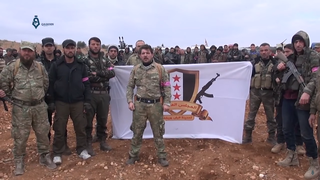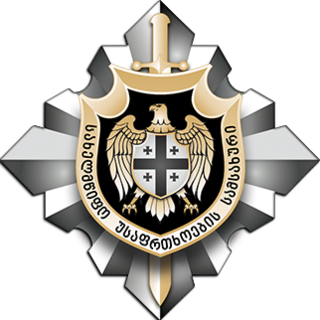
Counterterrorism, also known as anti-terrorism, relates to the practices, military tactics, techniques, and strategies that governments, law enforcement, businesses, and intelligence agencies use to combat or eliminate terrorism.

Ansar al-Islam in Kurdistan, simply called Ansar al-Islam, is a Kurdish Islamist militant and separatist group. It was established in northern Iraq around the Kurdistan Region by Kurdish Islamists who were former Taliban and former Al-Qaeda volunteers, which were coming back from Afghanistan in 2001 after the Fall of Kabul. Its motive is to establish an Islamic state around the Kurdistan region and to protect Kurdish people from other armed insurgent groups. It imposed strict Sharia in villages it controlled around Byara near the Iranian border.

Human rights in post-invasion Iraq have been the subject of concerns and controversies since the 2003 U.S. invasion. Concerns have been expressed about conduct by insurgents, the U.S.-led coalition forces and the Iraqi government. The U.S. is investigating several allegations of violations of international and internal standards of conduct in isolated incidents by its own forces and contractors. The UK is also conducting investigations of alleged human rights abuses by its forces. War crime tribunals and criminal prosecution of the numerous crimes by insurgents are likely years away. In late February 2009, the U.S. State Department released a report on the human rights situation in Iraq, looking back on the prior year (2008).

The Peshmerga comprise the standing military of Kurdistan Region, an autonomous political entity within the Republic of Iraq. According to the Constitution of Iraq, the Peshmerga and their security subsidiaries are solely responsible for the security of Kurdistan Region, chiefly due to the fact that the Iraqi Armed Forces are forbidden to enter Iraqi Kurdistan. These subsidiaries include Asayish, Parastin û Zanyarî, and Zêrevanî. The Peshmerga's history dates back to the 18th century, when they began as a strictly tribal pseudo-military border guard under the Ottoman Turks and the Safavid Iranians. By the 19th century, they had evolved into a disciplined and well-trained guerrilla force.
Terrorism and mass attacks in Canada includes acts of terrorism, as well as mass shootings, vehicle-ramming attacks, mass stabbings, and other such acts committed in Canada that people may associate with terroristic tactics but have not been classified as terrorism by the Canadian legal system.

The Bureau of Counterterrorism and Countering Violent Extremism (CT) is a bureau of the United States Department of State. It coordinates all U.S. Government efforts to improve counterterrorism cooperation with foreign governments and participates in the development, coordination, and implementation of American counterterrorism policy.

Kurdistan Region is an autonomous administrative entity within the Republic of Iraq. It comprises four Kurdish-majority divisions of Arab-majority Iraq: the Erbil Governorate, the Sulaymaniyah Governorate, the Duhok Governorate, and Halabja Governorate. The KRI is bordered by Iran to the east, by Turkey to the north, and by Syria to the west. It does not govern all of Iraqi Kurdistan, and lays claim to the disputed territories of northern Iraq; these territories have a predominantly non-Arab population and were subject to the Ba'athist Arabization campaigns throughout the late 20th century. Though the KRI's autonomy was realized in 1992, one year after Iraq's defeat in the Gulf War, these northern territories remain contested between the Kurdistan Regional Government and the Government of Iraq to the present day. In light of the dispute, the KRI's constitution declares the city of Kirkuk as the capital of Iraqi Kurdistan. However, the KRI does not control Kirkuk, and the Kurdistan Region Parliament is based in Erbil. In 2014, when the Syria-based Islamic State began their Northern Iraq offensive and invaded the country, the Iraqi Armed Forces retreated from most of the disputed territories. The KRI's Peshmerga then entered and took control of them for the duration of the War in Iraq (2013–2017). In October 2017, following the defeat of the Islamic State, the Iraqi Armed Forces attacked the Peshmerga and reasserted control over the disputed territories.
The counter-terrorism page primarily deals with special police or military organizations that carry out arrest or direct combat with terrorists.

Asayîş or Asayish is the Kurdish security organization and the primary intelligence agency operating in the Kurdistan region in Iraq. The organization was established in September 1993 and has been often referred to as an "intelligence agency", "security force", "security service", "security", "secret service", "secret police", or just "Kurdish police." Asayish coordinates and shares information with Parastin u Zanyari, the investigative arms and intelligence gatherers operating in the Kurdistan region in Iraq.
Parastin û Zanyarî is a government agency and the primary investigative arm belonging to the Kurdistan Regional Government in Iraqi Kurdistan. The organization is now a governmental agency that was established after combining and uniting Kurdistan Democratic Party's (KDP) intelligence service and Patriotic Union of Kurdistan's (PUK) intelligence service under the name of Parastin û Zanyarî. Parastin was first established in 1968 by the KDP. Parastin û Zanyarî has been sometimes referred to as a "Kurdish Intelligence Service". The primary function of the agency is investigation of crimes relating to both the internal and external security of the Kurdistan region. The agency officially has no power to arrest or detain but shares intelligence with the Kurdistan's security service, Asayish, which holds jurisdiction over a number of crimes in the region including terrorism.

Masrour Barzani is a Kurdish politician and serving as prime minister of the Kurdistan Region, an autonomous region in Iraq, since June 2019. He is also the chancellor of the Kurdistan Region Security Council and a member of the Kurdistan Democratic Party. He was sworn in as prime minister of the KRG’s ninth cabinet on 10 June 2019, after receiving 87 votes out of 97 legislators in the Kurdistan parliament.

The Iran–PJAK conflict is an armed conflict between the Islamic Republic of Iran and Kurdish rebels of the Kurdistan Free Life Party (PJAK), which began in 2004. The group has carried out numerous attacks in the Kurdistan Province of Iran and provinces of Western Iran. PJAK is closely affiliated with the militant Kurdistan Workers' Party (PKK), the primary opponent of the Republic of Turkey in the Kurdish–Turkish conflict. PJAK has been designated as a terrorist organization by Iran, Japan, Turkey, and the United States.

Turkey's involvement in the Syrian Civil War began diplomatically and later escalated militarily. Initially, Turkey condemned the Syrian government at the outbreak of civil unrest in Syria during the spring of 2011; the Turkish government's involvement gradually evolved into military assistance for the Free Syrian Army in July 2011, border clashes in 2012, and direct military interventions in 2016–17, in 2018, in 2019, 2020, and in 2022. The military operations have resulted in the Turkish occupation of northern Syria since August 2016.

The Women's Protection Units or Women's Defense Units is an all-female militia involved in the Syrian civil war. The YPJ is part of the Syrian Democratic Forces, the armed forces of Rojava, and is closely affiliated with the male-led YPG. While the YPJ is mainly made up of Kurds, it also includes women from other ethnic groups in Northern Syria.
The Kurdistan Region Security Council or KRSC is a high-level national security council in Kurdistan Region of Iraq.
Qatar has been accused of allowing terror financiers to operate within its borders, which has been one of the justifications for the Qatar diplomatic crisis that started in 2017 and ended in 2021. In 2014, David S. Cohen, then United States Under Secretary of the Treasury for Terrorism and Financial Intelligence, accused Qatari authorities of allowing financiers who were on international blacklists to live freely in the country: "There are U.S.- and UN-designated terrorist financiers in Qatar that have not been acted against under Qatari law." Accusations come from a wide variety of sources including intelligence reports, government officials, and journalists.

The National Counter Terrorism Agency is an Indonesian non-ministerial government department that works to prevent terrorism. BNPT is headed by a chief, who is responsible to the President. When it was first launched, the leader of BNPT held the ranking of a civil servant but the Presidential Regulation in 2012 elevated the post of BNPT Chief to the ministerial level.

The State Security Service of Georgia (SSSG) is a state intelligence agency of Georgia, under the authority of the Government, which covers a broad spectrum of tasks to preserve national security in accordance to state legislature and relevant laws. Its missions are to protect the constitutional order, sovereignty, territorial integrity and military potential of Georgia from illegal acts of special services and individuals of foreign countries; to prevent violent and unconstitutional change of order and state authority. Further it is to ensure economic security and fight terrorism on national and international level, transnational organized crime and international crime as well as carry out measures towards prevention, detection and suppression of corruption.

Lahur Talabani, also known as Lahur Sheikh Jangi Talabani was the Co-President of the Patriotic Union of Kurdistan, and the former Director of the Zanyari Agency, and Former Director of the Counter Terrorism Group (CTG). Known commonly as Sheikh Lahur, Talabani was a leading figure in the fight against terror especially in the fight against the Islamic State. After being losing a leadership battle and being ousted from the Patriotic Union of Kurdistan, Lahur proceeded to found his own party, the People's Front.

The White Flags, also known as Sufyaniyyun, are a militant Kurdish Islamonationalist group which are an offshoot of Ansar al-Islam. They are based in the disputed territories of northern Iraq opposed to the Iraqi government. Their appearance was first noted during the Battle of Kirkuk in October 2017, when the Jambur oil facility was secured by Iraqi forces in October 2017 as the federal government regained control of disputed territories which were taken by the Kurdish Regional Government.













